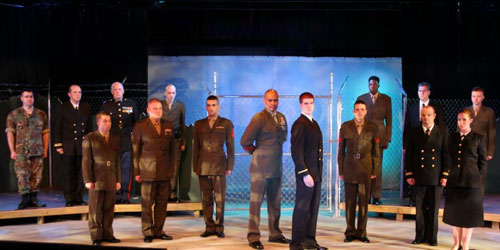By Bridgette M. Redman

Ever since Shakespeare first penned the directive to "first kill all the lawyers," those of the legal profession have often gotten a bad rap on stage and screen. They are perceived not as honorable warriors fighting a battle between good and evil, but rather as opportunists merely concerned with whether they can win or lose regardless of right and wrong.
What makes "A Few Good Men" such a powerful drama is its ability to question the cliche without disregarding it. The lawyers are engaged in ethical questions that stretch everything about their self-image and their view on the world. With a Marine dead and two of his unit members accused of poisoning him and hazing him to death, the lawyers can plea bargain a result out of court or they can engage in the public relations nightmare of court-martial proceedings.
What A Do Theater manages every movement in the production to maximize the intensity of this struggle on the part of the lawyers, the court, the squad-level soldiers and the officers who command them. Director Randy Wolfe tightly choreographs every movement, strictly conducts the volume of the voices and coordinates a myriad of special effects including continual water haze, strobe lights, and a steadily rhythmic beat of original music.
If the delivery of the actors at the beginning started out with a stiffness that went beyond the crisp movements of military precision, it was forgivable because the characters soon grooved into the roles with characters becoming real and layered long before the intermission. They soon begin speaking as characters and not just to deliver an emotional response on the part of the audience.
By the end, the lead and supporting actors are invested and intense. Scott Whitesell as Sam Weinberg, the reluctant defense attorney who has little sympathy for his clients, was real and relatable from his first appearance. His delivery was always human and transcended stereotypes. Adam Bielby and Joshua Olgine played the two Marines, Private Louden Downey and Lance Corporal Howard Dawson, caught up in something bigger than themselves, pawns in a game of honor. While Downey was lost completely, Olgine managed to add complexity even to Dawson's silences, and his struggle with honor, strength, humanity and sacrifice underlined the show's major themes.
The three characters who lock horns the most each created different approaches with clashing personalities, goals and beliefs. David Lew Cooper as Defense Attorney and Navy LTJG Daniel Kaffee was first insouciant and then passionate, a seemingly devil-may-care hotshot who escapes pressure by pretending to be indifferent. His transformation is compelling and drags the audience along his journey from win-lose to right-wrong.
Ron Ware's Lt. Col. Nathan Jessup fulfills his self-described moniker of grotesque. He is a commander first and last who never questions that what is best for him is best for the country. He alternates between good ol' boy and intimidating bully. In pursuit of saving lives, he is willing to sacrifice others for not just the good of the greater number or the good of the country, but for the good of his career.
Tara Bouldrey, a member of What A Do's resident company, holds down the role of the sole woman in a cast of 15, a woman who is out of place despite her militarism and strict adherence to policy and legality. It is difficult to sympathize with her sharp treatment of others, but she gradually shows greater vulnerability with varied vocal delivery that makes her more human.
Dave Stubbs portrayal of Capt. Matthew Markinson is heartbreaking as a man committed to honor and the Corps who finds himself caught between his convictions. Nicholas Mumma maintains an intensity as Lt. Jonathan James Kendrick, an imposing man who can intimidate and bully his fellow Marines and has a religious fanaticism that fuels his violence.
While the heart of this drama is the story itself, the technical aspects are certainly a star of this show. The stage is set from the moment the doors open, with Ted Hatton's lighting design always noticeable with special effects shooting through the smoky fog, sometimes strobing to John Purchase's original soundtrack. Madeleine Gibson on the light board keeps up with the complex lighting plot, putting on an electronic show that easily rivals the drama on stage. The music does become reverberatingly loud, and those sitting near the speakers may find the sound effects sometimes overpower the spoken words.
Wolfe brought in two military consultants, and their influence shows in the sharp movements and the set and Nancy King's costuming.
By the show's end, the audience is left with much to think about, including such questions of what it means to guard the fence between freedom and tyranny.
REVIEW:
'A Few Good Men'
What A Do Theatre, 4071 W. Dickman Road, Springfield. Thursday-Saturday through May 19. 165 minutes. $20. 269-282-1953. http://www.whatado.org










